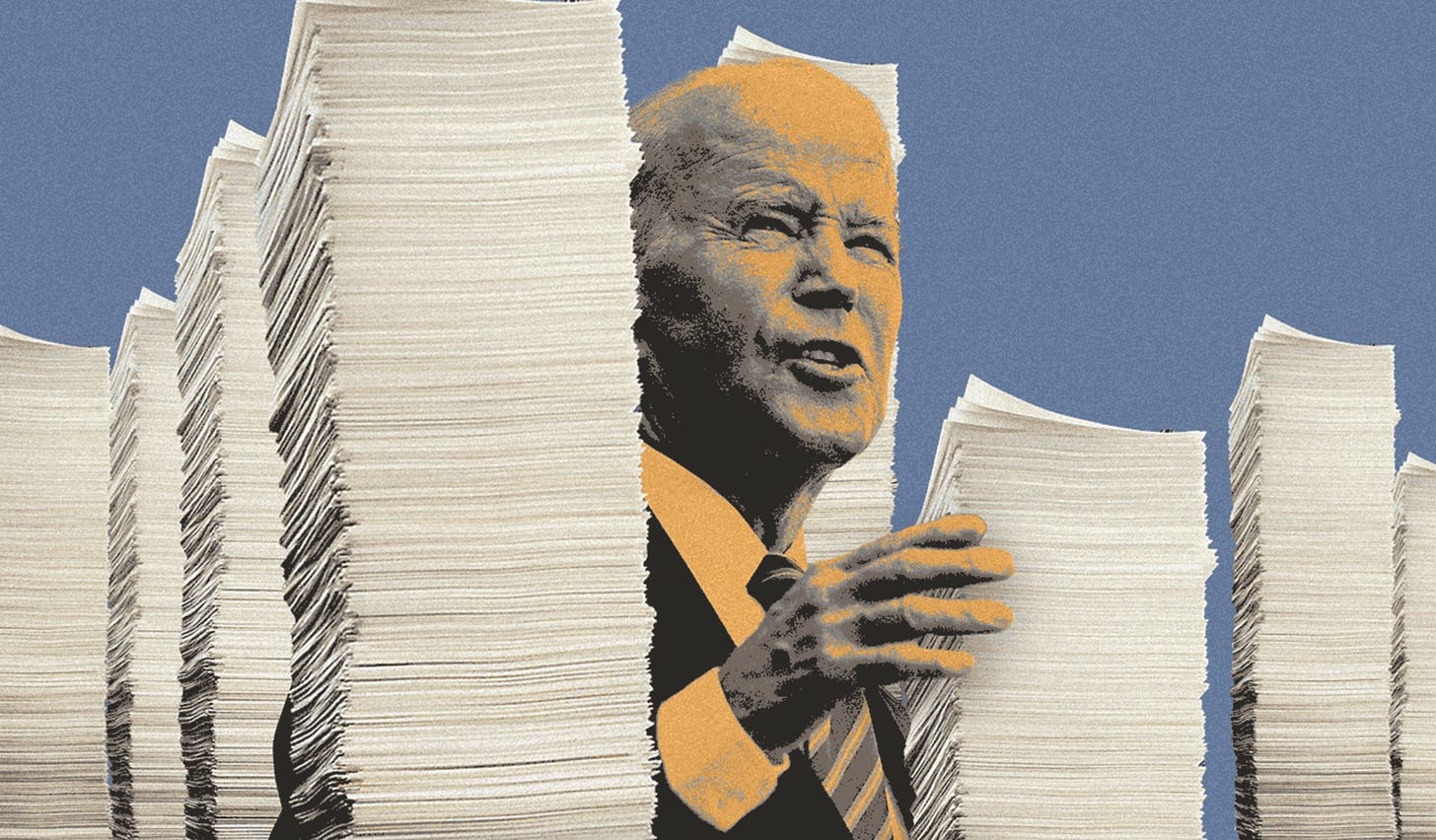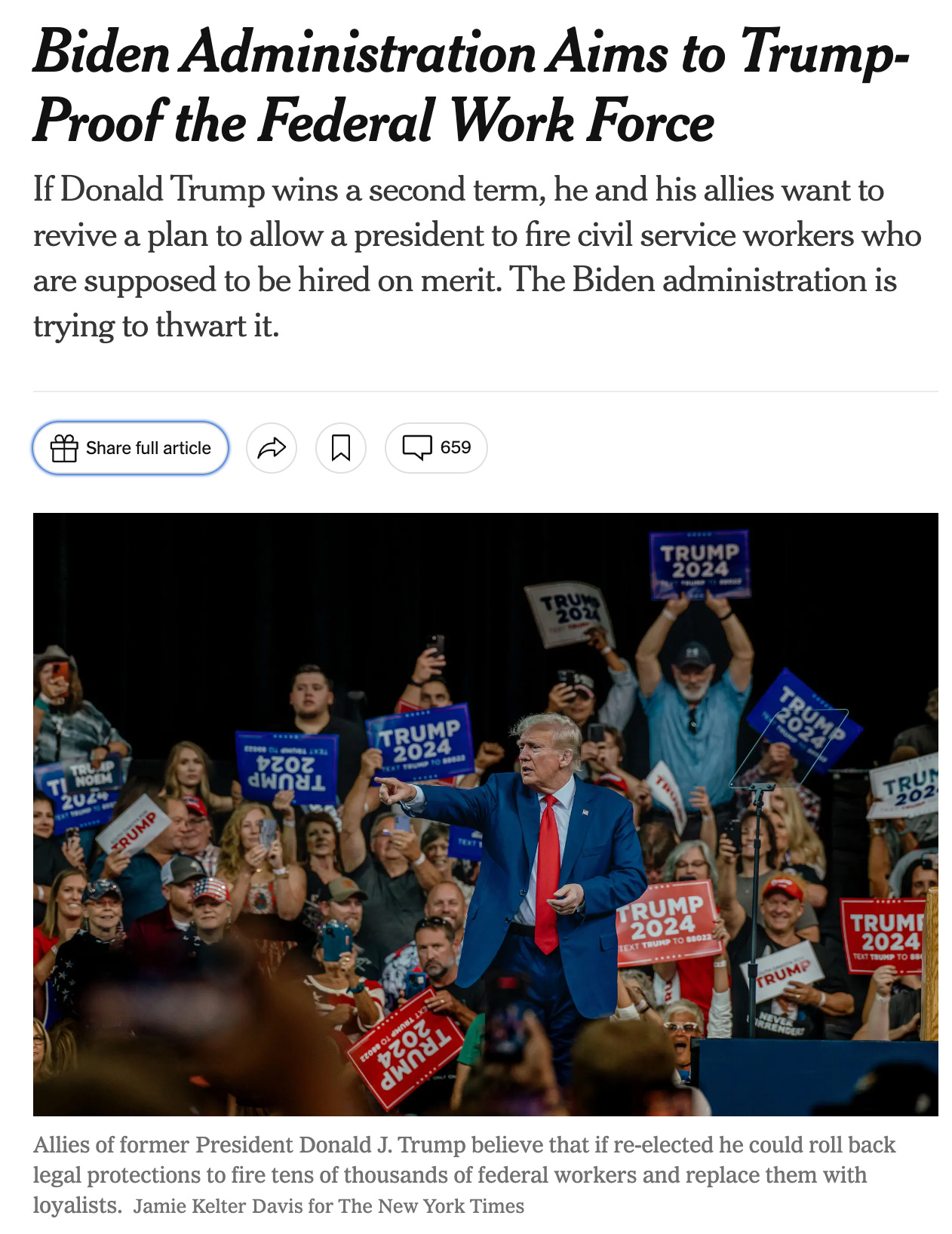Some important news on administrative burdens and politicization
Some reading worth your time
I wanted to highlight two pieces that came out over the last few days and flew a little under the radar.
The first is The Biden Administration Is Making It Easier To Get Government Benefits by Paul Blumenthal at Huffpost.
This is the single best piece I have seen about the Biden administration’s efforts to take on administrative burdens in any mainstream news outlet. One of my general gripes about studying public administration is that you will see many more deeply investigated pieces about politics than about the actual functioning of government. This is one of the rare exceptions. (Full disclosure: I was interviewed for the piece). There have been other well-reported pieces on burden reduction in specific policy areas, e.g. student loan reduction. This reflects the fact that we have policy reporters who have extraordinary knowledge about specific policy domains, but may not take a whole-of-government perspective. By contrast this piece presents burden reduction in the way the people at the White House do: as a governmentwide effort to instill a series of principles to fix government services across.
The other strength of the piece is that it balances both the very big picture (for example, noting how “welfare queen” tropes lead to more frictions in government) with the nitty-gritty of specific tools that people working inside government rely on, such as the Paperwork Reduction Act. This makes it ideal for a anyone teaching a basic politics, policy or public management class. The piece is not simple cheerleading for the Biden administration — it is realistic, for example, about the challenges of federalism. There is no shortage of pieces about government failures, which tends to encourage governments to be risk averse. If we want to see more efforts to improve government, we need to pay attention to efforts like this, and that involves treating them seriously as a topic for media coverage.
The second piece is actually two pieces that cover the same ground Biden Administration Aims to Trump-Proof the Federal Work Force by Jonathan Swan, Charlie Savage and Maggie Haberman and Biden administration proposes new rule that would limit Trump purge by Tyler Page and Lisa Rein of the Washington Post.
I’ve written extensively about Schedule F, the executive order that would allow Trump to reclassify civil service employees into political appointees, stripping them of job protections, and allowing the President to politicize the civil service to an extraordinary degree. It is the biggest threat to American democracy that the fewest people are talking about. Swan’s prior reporting has given the topic greater attention by revealing how Trump supporters (and now much of the rest of the Republican Party) see this tool as a vehicle to exert revenge on the so-called deep state, or, in the words of Ron DeSantis, “to start slitting throats.”
Biden repealed Schedule F. The new pieces both report on an initiative by his Office of Personnel Management to further protect civil service employees. OPM is proposing a rule that would would allow civil service employees to retain job protections if they are converted into Schedule F status. It seeks to narrow the type of employees who could be involuntarily converted, emphasizing that it should be limited to noncareer staff. Both of these are good things in my view. The initial executive order was extraordinarily vague about who might be subject to reclassification, and the author of the order, James Sherk, suggested that Trump would reclassify 50,000 employees. (For reference, the US only has about 4,000 political appointees at the moment, so this would be an enormous change). And Trump and his supporters will have been explicit that they intend to use the firing power to embed personal loyalty to him, rather than the constitution, as the central value of the civil service system.
You can read the proposed OPM rule itself here. It is 77 pages long, and much of the rule seeks to put on record the case for why Schedule F is at odds with Congressional intent, as well as evidence about what facilitates good performance in government. Again, I think this is broadly correct. Over the course of the 20th century, Congress delegated a lot of authority to the executive branch on how to run the bureaucracy, but there is no body of evidence to suggest that it intended a return to the spoils system, which is what Schedule F would amount to. Having built a civil service system to limit politicization, it assumed Presidents should have some flexibility. Congress has allowed the number of presidential political appointees to grow by about one quarter in the last 30 years, but it certainly did not intend for it to grow by more than 1300% overnight, as Trump intends.
As a federal proposed rule, anyone can comment on it, including you! And believe it or not, federal officials really do read those comments. Providing a well-informed comment on the value of a civil service system, and the damage of politicization, would be timely. Go ahead and do it!
If you are breathing a sigh of relief because the Biden administration has limited the threat of politicization, I am sorry to tell you are wrong. As the article points out, a future Republican administration can reverse the rule. This will take some extra time, and so the new rule would stop a President reimposing Schedule F right away. James Sherk classified the new rule as a mere “speed bump, but nothing more.”
Congress should act, if for no other reason than protect its Congressional power. Once Schedule F is in place, its ability to exert meaningful oversight will collapse, since it will become much easier for a President to stonewall requests for information and testimony from employees who are afraid of being fired. But Senate Republicans refused to support a legislative fix to Schedule F when Democrats held the house. Now that House Republicans are in charge, there is no prospect of a legislative solution anytime soon.
Ultimately, the battle over Schedule F will likely end in the courts. The new rule will provide more on-the-record evidence for why politicization is a bad thing. And in rewriting the rule, Schedule F proponents will have to draw on a much weaker evidentiary case to argue for the merits of their policy, while pretending that this is merely about improving performance. But as I’ve noted since the original order was passed, Trump created a Supreme Court that is deeply dubious of the administrative state, and so may be perfectly willing to embrace politicization instead.





Thank you for the information and the links. This is good news.